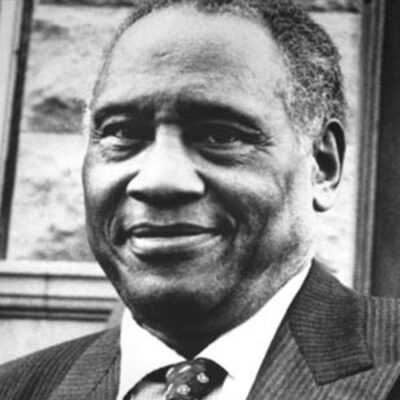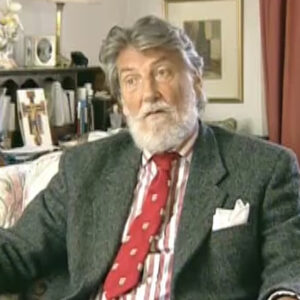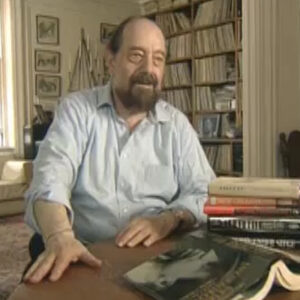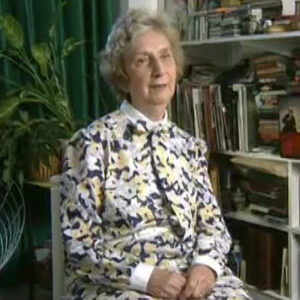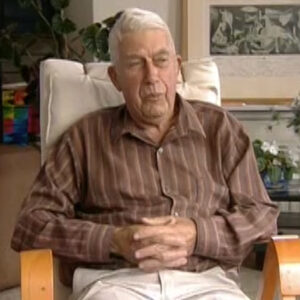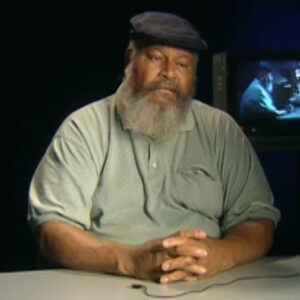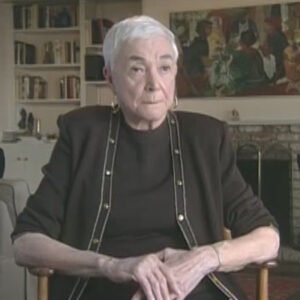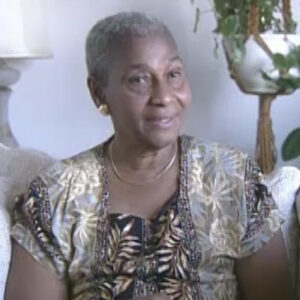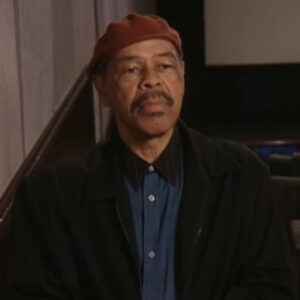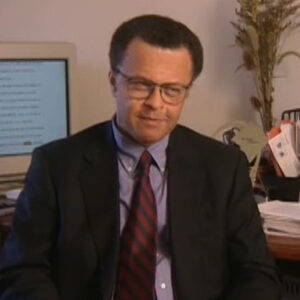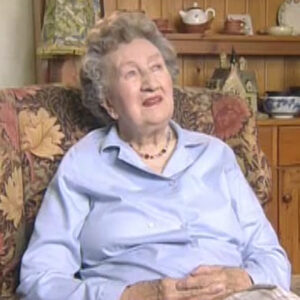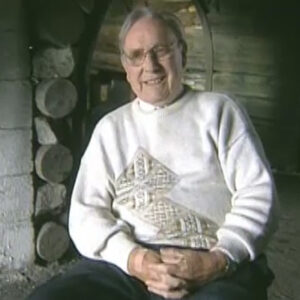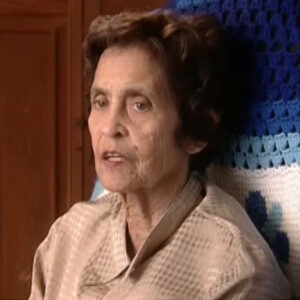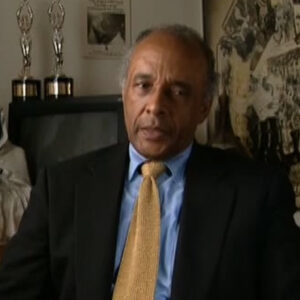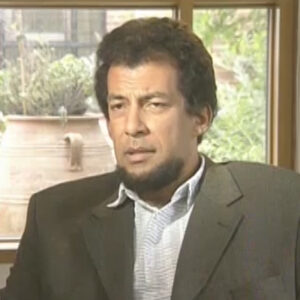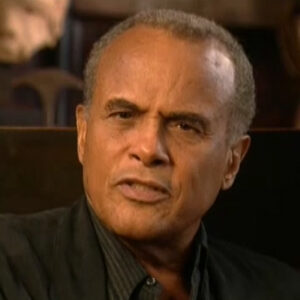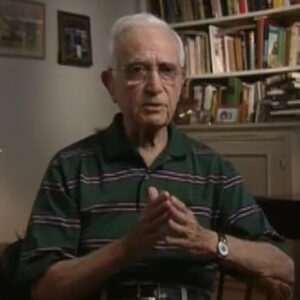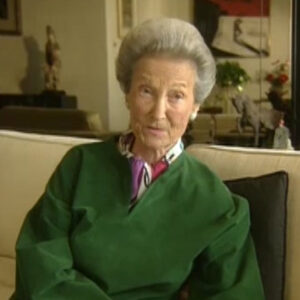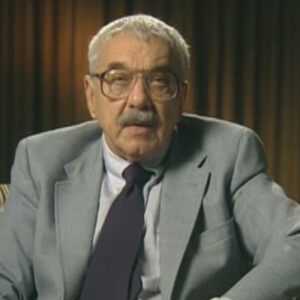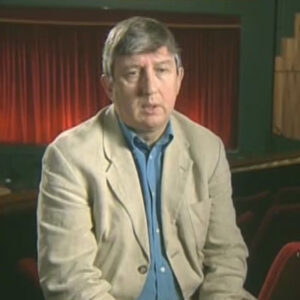Speaker I was in Trinidad and I saw Polaroids in 1947. By that time, I’m not sure if sort of whole world pressure was on him to the extent that it happened after.
Speaker And he sang he did the usual concerts for money. But as he did in those days, he sang Free for the People and he sang in a place called Woodforde Square in Port of Spain, which one of our prime ministers renamed the University of Woodforde Square much later on. And it was a marvelous sight, you have to imagine us people in a small island very few people knew anything about, and he came and he sang, but we knew his name. We knew Paul Robeson’s name very, very well. And the usual stance that he took with his hand cupped over his and he sang. But what is still in my mind is when he finished singing and the crowd just went mad and he walked into the crowd in a suit and he came out with just a shirt and trousers. Of course, the people tore his clothes off and bits of the jacket was taken by people in the crowd. It was amazing sight because I had never seen anything like that. And I don’t think anybody else saw Paul Robeson stuck in my mind from 1947 to now.
Speaker So then from there, where did you go after that? You personally?
Speaker Personally, I did a few jobs. I think I left school that year or the year after. I can’t remember exactly.
Speaker I did a few jobs and then I went out to sea and it was a Bogside boat that ran in the Caribbean in the question is a great, honest Trinidad and etc..
Speaker And we used to go to the States or Canada once a year to get them get the bottom fixed up because we we were not horrible boats. And the X landing crafts from the United States because they were convenient, the United States towards the Second World War and the Korean War. And they were convenient because they can go up the rivers in South America, the Mongol River and SRAM and McKenzie and Guyana, etc. But of course, they were useless. They were made for one trips to Korea and back, but they were used for.
Speaker When did you get to England? I got to England in 1954. But the point I was going to make about going to the United States is that I went to the United States and 50 or 51 year McCarren Walter McGovern act and I went to Baton Rouge and Mississippi spent we spent three weeks on dry dock.
Speaker So I had a feeling of what Paul Robeson was about by being in that kind of place at that particular time in history. Were you political then?
Speaker I was political in the sense that everybody in my generation, living through the Second World War became political because the Soviet Union meant a lot to our people and that was freedom, etc., etc. Hence the polar opposites and the Claudia Joneses of the soil and the wretched rights of this world. So always political to that extent. Oh, intellectually capable. I was I wasn’t sure, but I knew where I was.
Speaker So when we’re closer to me, if you could.
Speaker OK, um, did you what what did you do when you got to England and when was the next time you met Paul Robeson or at least came into his influence?
Speaker I’ll answer the last question first. I met Paul Robeson when he regained his passport and he came to this country. I met him for the first time personally when he gave a concert and launching of his book.
Speaker Here I stand at Brixton Town Hall and I have a signed copy of that book.
Speaker And an interesting thing happened at that time is that Harry Belafonte was singing the Albert Hall. And the right wing newspapers use that because that here was Paul Robeson in Brixton and he was Harry Belafonte, Belafonte at the Albert Hall.
Speaker I think it was a real good one.
Speaker And little did they know that Harry Belafonte was very sympathetic to Paul Robeson.
Speaker But they didn’t know then that they thought Harry Belafonte was doing their thing and they compared that to people who were just old man black and Africanness. And here was Harry Belafonte with this sort of aquiline features, et cetera, and they use that cultural thing.
Speaker But some of us knew what the score was, which is interesting.
Speaker So now we want to just ask you to take the clock away. All right, Roland. Very well. Soon. Yeah. So you get you get 250 for a number one.
Speaker Uh, it means you start over again.
Speaker When what was the first time you met Paul Robeson again?
Speaker I met Paul Robeson again in 1958 when he came off to his passport, was given back to him at a concert at Brixton Town Hall where he was signing and selling his book. Here I Stand.
Speaker And that’s the first time I touch the man.
Speaker Were you involved in the in the, uh, the movement to restore it?
Speaker Yes, I was a Communist Party member. There were certain things that we did. And Paul Robeson was a symbol of everything that we like, the unity between races, et cetera, et cetera. And of course, he made that famous statement about when I stepped on the Soviet Union, I felt for the first time in friend. And at that particular period in history, we all shared that sentiment with Paul Rose and Paul Robeson.
Speaker But did you work on the same campaign? Yes, yes. Yes, I worked what I was explaining that to sort of surround the reason why we worked as hard as we did on the campaign.
Speaker And I can remember not very far from here at the same time as it was then called the St Pancras, don’t always know the Camden Town Hall.
Speaker And there was a large overflow concert for Paul, an overflow meeting, I’m sorry.
Speaker And he spoke by telephone to this conference.
Speaker And there were many people who have never really heard Paul voice in life. We heard him on films, we heard him on records, etc. And for the first time, we heard him thanking us for the campaign that we were doing. And it was a marvellous, pure and exciting period, period that was laced with goose pimples. Just hearing that voice.
Speaker What what what was what was the condition of race relations.
Speaker And when Paul was saying at the time when Paul came back here, what was it like?
Speaker It was awful.
Speaker And we have to say, got the conditions, remember? Yes. Because, I mean, it is the conditions that oh, yes, the conditions of race relations were awful at this particular time in history.
Speaker We thought we knew the British, but we knew something about the British books cetera and the churches in Central, the British knew very little about us, and they treated us in the stereotypical way that anybody would treat strangers, particularly black strangers, particularly black people of African descent. And the political conditions were that we were citizens of the British, all the colonies and the United Kingdom. It meant that we couldn’t come and go freely. But when they contemplated on the idea that there were millions of us, they had to do something about immigration control. But just to give you one example, there were advertisements in the newsagent windows, advertising rooms or flats to that.
Speaker And that particular thing that was said or written on those cards, no blacks, no Irish, no dogs and sometimes no children.
Speaker And that, in a way, is an example of the problems we have. And there was also there the problems of whenever immigrants go anywhere, people feel that you are going to undercut salaries and wages.
Speaker And that was a great fear of the workers because they were much more vacancies than workers at the time and hence the economic pull of us coming from the Caribbean.
Speaker And so what were the kind of things that were what were the kind of activities that the left movement did?
Speaker And was there a difference in the way black leftists were treated as opposed to the white leftist?
Speaker But did you sense that personally?
Speaker Black left is I, I, I personally felt something, and I’ll give you an example of that, I was selling all the paper, The Daily Worker, outside the same St Pancras, St. Paul, which is a few yards from where we are now, and a white guy in a pinstripe suit, the epitome of British decency and et cetera. I think he had a bowler hat on. He passed and he stood and he bought a paper from me.
Speaker And before I could think twice, he spat in my face. He said, I don’t mind you people coming here, but to come here and sell the daily work is the greatest insult. And he ran. You know, the funny thing is bowler hat and white guy running down the streets. I didn’t worry about I didn’t worry too much about it. I felt really insulted. A fella spitting in your face. But that was an example of how people saw the left. As far as authorities were concerned, the police did treat us differently from the word holiday. Would the white communist or white person demonstrating on the streets. And they certainly didn’t accept in their minds that we had equal rights. As far as you know, the left didn’t have equal rights, but it was worse for us to be making that statement or political statement.
Speaker Yes, we were treated differently.
Speaker Where were the many black lefties?
Speaker Well, there weren’t many black people were proportionately. There were lots of black lefties. We felt the Communist Party was home. Very few people joined the Labour Party because the Communist Party in those days and bress embraced this feeling of internationalism and black and white unite and fight. That was the slogan in those days. And the Labour Party and the French certainly Communist Party did not. Sorry, I’m sorry. The Conservative Party didn’t.
Speaker But yes, we all every nearly everybody who came here, particularly the students workers, had a difficult time because they had to work. Some were going to evening classes and they had to take care of young families, etc. But particularly the students, the West Indian Students Union would want the popular papers of colour a hotbed of leftism.
Speaker Interesting, um, do you think?
Speaker Do you think that Paul, when he came here during this time, do you think that he was used by the left to attract, uh, working class people of color into the ranks of the left?
Speaker Well, obviously, this is in hindsight, the Communist Party on the left is like any other organization or institution. They’re going to use the best things that they have got. And Paul Robeson was probably the best thing that any organization could have. We were quite conscious that he was I use the word superhuman because in all the things that Paul in one person did and he was he was he was used and he didn’t epitomized. I’ll rephrase that. Yes, he was used.
Speaker But I think the left recognized that Paul epitomized all the things that they believed in.
Speaker OK, OK, if so, OK, so you’re saying that they use Paul, but it was OK because he knew he was being used and he epitomized.
Speaker Absolutely, absolutely.
Speaker Um, with a successful in that effort, though, did they in fact, bring in a lot of blood or people of color in the left?
Speaker That wasn’t a worry in 1958 for the left of the Communist Party because that the Communist Party was our home and that wasn’t a problem. We weren’t attracted to any other organization, the only other organization, and that black people were attracted to the churches. And they we very quickly found out that we weren’t welcome culturally into the churches and were treated rather badly. And and I would think that the biggest social movement in this country formed in those days is the growth of the black churches. White churches are closing down and black people are buying them. It’s the only one of the only things they are doing successfully. You compare ourselves with Asians.
Speaker No, there wasn’t a problem then. We didn’t have a problem then. What I must explain to you that those of us who joined the British Communist Party, we didn’t join the British Communist Party, we joined an international movement to white nationalist, but we joined a movement that was sort of pushing the frontiers back as far as our freedom was concerned. Yeah. And Paul’s message, Paul message was that one was much communication between the American Communist Party and the British Communist Party that, you know, yes, there was a hell of a lot of communications, mainly because of the English speaking thing, and that many of the many American communist wo English or Scottish or Irish communists. So there was that kind of cultural contact. There was a moving part later on because the American Party seems to be stuck in some what we now call Stalinist mode. And we were changing rapidly.
Speaker And now regarding Paul, he got sick here and he got he went into a funky he actually there were rumors of an attempted suicide.
Speaker He was definitely in a, you know, sort of a hospital, you know. What do you know about them?
Speaker Yes. Paul got ill here. Many of us weren’t surprised because we recognize that a man spending all his life against the stream from Rutgers, we weren’t surprised. But the Communist Party in the movement was such a closed shop in those days that didn’t it wasn’t popular knowledge. People didn’t know this thing. It was kept very, very, very quiet. I was fortunate to know something about it because I knew Claudia Jones, one of his comrades from the United States who was a Trinidadian Trinidadians was born in Trinidad, etc., and she was thrown out of the United States during the McCarthy period.
Speaker I was a good friend, in fact, a relative of Klaudia, and she was my mentor. I don’t know if there’s a feminine word for mentor, but she was my mentor. And through her eyes, you do.
Speaker To tell me a little bit more about her before you go.
Speaker Oh, Claudia Jones was one of the people whom the McCarthy period took advantage of.
Speaker As I said earlier, she was born in Trinidad and she went to the United States when she was eight years old. She lived in Harlem and she went through all the experiences that people went through. And the fact is, she joined the Young Communist League. She was a journalist. She rose in the Communist Party. She became an executive member. So she was good fodder for the McCarthyite people, McCarthy and his people. And she was expelled from the United States and they wanted to expel her to Trinidad. At that time, Trinidad was still a colony. And the governor then, I think is going around, she said, no way you’re going to send her back here. Obviously, she going to make trouble. And he said, you made her communist. You keep up. Anyhow, there was some arrangement with the British government, the colonial office at the time, and she was expelled with the other English and Scottish comrades who. From the United States, that’s how she came here, and she was welcomed with open arms because she was a heroine for most of us and until she took over running or we had one black newspaper at the time which was called Caribbean News, and she took that over.
Speaker There’s a lot of space between the taking over and a lot of discussion. But she took that over and it became Caribbean West Indian Gazette.
Speaker The mere fact that she moved from what we would have considered a Caribbean time to the Caribbean to West Indian. It was her very clear understanding of where people were at the way from the islands. English-Speaking we were felt West Indian, not Caribbean, then we are not after the Cuban revolution.
Speaker So that’s where she was at. And she had this this great ability that very few people have to unite people, and especially in the black community, she united people from different backgrounds in this in the white community, the Communist Party, emphasis on class, she emphasized on race. So she had the doctors, the dancers, the actors and the workers. And that was her great ability. It was fierce for us.
Speaker OK, so it’s OK, let’s go back to Paul’s getting sick and you are privileged to know for her and what I was told was that she told me rather crudely, not in the way the English would have said that he’s ill or something like that.
Speaker She probably might have had a nervous breakdown, but I got the idea that he had gone mad. And. Three people were allowed to see him alive, when I see alone, I use that word because the Communist Party was in control and the three were communists. One was assistant general secretary of the Communist Party at the time, Gianni Gollan.
Speaker The second was another communist, Harry Francis, who was the assistant secretary general, secretary of the musicians union, then a very powerful progressive, both powerful and in the sense of progressive.
Speaker And the other one was Claudia Jones, for obvious reasons and cultural reasons, because if you have to talk to a guy who is going off his rocker, you have to have that cultural.
Speaker Sympathy. So those were the three people ostensibly they used to go to play chess with ropes. That is that is how we understood it. And then he was shifted out of this country. And he was sent to the Soviet Union. But mental illnesses, as you know, we all know, it’s a it’s a problem and I don’t think they were successful. They could have given giving them drugs, etc. And then he went to East Germany because everybody always thought the GDR was culturally closer to our culture than the Soviet Union.
Speaker But it didn’t work either. Then you returned to the United States and to Holland, his sister’s house.
Speaker Do you remember? Plus, up to the deposit. Do you remember what Claudia said to you specifically about his treatment?
Speaker Crowley didn’t say very much about his treatment, and she wasn’t very distrustful about it. But I think she was dissatisfied because she didn’t tell me about his treatment, but she did say that he was shaking his head from side to side. And anybody who knows anything about mental health, that’s a very severe sign of not only a breakdown, but a total loss of who one is and where one is.
Speaker In the first instance, very few of us could have withstood the onslaught that Paul Robeson went through all his life.
Speaker You would also remember that Paul Robeson, one of his strong cards was that he wasn’t a member of the American Communist Party and that he was a socialist, etc.. And you also remember that the statement he made about stepping on the Soviet Union, that I assumed that by educating his son poorly in the Soviet Union, he was doing something that politically and socially he was unable to do. And as I understand it, this was what was said at the time, as I understand it. He went back and he became a member of the American Communist Party.
Speaker And he left.
Speaker And that was the straw that broke his back. That is what was commonly said in this country, how much it is a fact. I am not sure.
Speaker Wait a minute, what was it that destroyed the straw when Polly young son left the American Communist Party? That was the straw that broke the camel’s back. Broke the camel’s back. Because Paul Senior was never a member.
Speaker He might have been a fellow traveler or whatever we call, and but he did believe in the scientific socialism and he couldn’t do it. And he felt that his son couldn’t. No, I never had that discussion with him. That is a rumor. How much fat that is. But I think as a human being, I can understand that to be a very important factor.
Speaker It’s interesting.
Speaker What about see, at this time that did you know I met Year? What did you think of.
Speaker And if it first an instant, it was amazing because we have this in the in the Western news, you have this color business and I saw the difference between these two people of color. I thought, know the brown skinned or yellow Americans, they always marry successful black ones. So that was the first. But she was his strength. She was his right hand. From what I saw. I saw them together and on many occasions and Claudio would refer always referred to Paul’s wife and the kind of loving, caressing voice.
Speaker And they were very, very close. But it was always and she and she was always there for Paul. It was she was his strength.
Speaker What was his relationship to the party, to his political friends?
Speaker I never figured that one out, but based on her relationship with Claudia and as I said earlier on, Claudia had this ability to befriend and pull people to her bosom that isn’t anything but based on that relationship. And she could not have had that relationship with Claudia without she was closely connected to Paul’s ideas and his feelings and sensitivities.
Speaker But you don’t know really what their relationship with whether she agreed with him.
Speaker So, yes, I am saying she agreed. She went along with Paul.
Speaker There was no acrimony between them as far as a political relationship was concerned.
Speaker You know, that Paul had other women, obviously. Well, that.
Speaker Well, that was said and that was said. And I say that about any any brother who is successful and wanted Martin Luther King, et cetera.
Speaker But I was wondering if you think I put any stress on there.
Speaker And I really was. You know, he was.
Speaker One of the things you’ve got to understand is the historical context in which people with important historical and political context. Not even the right wing press would have sullied Paul’s name by raising some of these things about his relationship with women that I have never read.
Speaker But it went around that Paul Paul had one of the people the name that was called was Nancy, on the areas of Cunard shipping lines.
Speaker And she’s she’s a well-known person in literary circles about somebody who had a good time.
Speaker So not surprising. Um, did Claudia ever mention Paul by screaming or.
Speaker No. Yeah.
Speaker So there was no no mention any kind of, you know, shock treatments or any kind of harsh treatment that he received prior?
Speaker No, Claudia never talked to me about that.
Speaker But I think some of us outside assumed that he was going through something, but we just didn’t have an assumption. I wouldn’t dwell on that because I know nothing about that.
Speaker OK. There was also rumors that the FBI actually tried to poison him and tried to that his illness by Paul Junior thinks that his illness was a result of FBI interference, that they tried to drag him in some way. Were there any rumors about that? Did you hear?
Speaker It wasn’t only a rumor.
Speaker It was a very strong, very strong feeling that the FBI was involved in his madness. And many of us believe that many of us didn’t take the sort of power leaving the Communist Party as their crucial business.
Speaker And we weren’t surprised. I mean, it was just after the Rosenbergs, you know, we weren’t surprised and.
Speaker I wouldn’t be surprised if you went to Russia today or give the material is still there where he said that you might find material pointing to that. I would not be surprised.
Speaker OK, um, the FBI messing around with people, particularly black people. That was like a fact of life. We you know, it was a fact of life. That’s that’s how we understood it.
Speaker And we didn’t think that the people being the kind of public enemy number one to the status quo in the United States, they would have taken the defeat, as they did, to return his passport because of world pressure that easily.
Speaker And so this was payback for payback.
Speaker Yes, well, we we weren’t surprised by that, but I didn’t want to mention that because there’s no proof about that. But that was common knowledge and feeling and it has gone down in our history.
Speaker Well, this is the way you should mention stuff like that in this interview, because it’s the only way you’re going to get it. You know what I’m saying?
Speaker That’s right. That’s right. I take that point. Yeah.
Speaker Now, are there any other things that you want to say about Paul and his effect on, uh, people in Britain, like people in Britain, the way left in Britain that was or is in the long run?
Speaker The fact is stupendous. We have to thank Paul Robeson. For standing up so early about Africa because Africa was in Africa to do the English was the lowest of the low.
Speaker We have to stand up for that. We have to stand up. We have to say the Poles stood up for the artists because although black artists were popular and are popular, they were popular in a Stepin Fetchit sense.
Speaker I don’t know if you young Americans know who Stepin Fetchit is, but it was Paul Robeson, an athlete, a singer, a linguist, a lawyer and a thinker and a humanist and a communist. That’s a popular feeling. So we he he was an advantage for us. And I’ll end this with a little a little story. I run away from being called up in the Army in 1956 in this country, and I went and joined a group of people called International Brugada who were building the library in the GDR. But part of the work I did for the Friday children was to go around speaking to young people, students, etc.. I remember speaking to a group of librarians, young student librarians, and at the end the usual thing, they came on to ask for autographs, etc. And there was this young, very pretty typical German blondish and sort of asking me if I can give addresses of pen pals, et cetera, in England. And I gave her friends brainpan and she said, I hope he’s as I hope he’s as famous as you and Paul Robeson.
Speaker So that’s the legacy that Paul left for us.
Speaker It was this young woman seeing me. And what she saw wasn’t me was Paul Robeson. So he left that, not even there. We left it in where he left it in Scotland. He left it at the Unity Theater, which is just around the corner from this hotel.
Speaker So that answers that question. And everything OK?
Speaker I think if anything, I want to say, OK, it was a sweetness in life, but a slight bit of sweetness and light between the black left and white left without any problems in terms of race, not maybe racism, but prejudice and assumptions.
Speaker There were serious problems and no one can look back on those problems between serious problems between black people who went the Communist Party and the left generally, and white people. For example, there was a very serious ideological one, the British Communist Party, in its roads to roads, to socialism, a British road to socialism. Felt that the British Communist Party was the center of ideology in the Empire. And some of our Caribbean brothers and sisters who developed at home not hearing about it and came here, they argued against that and they said, look, there’s a possibility that we could use Cuba as a center of everything in the Caribbean and not Britain.
Speaker And in the long run, that one out one day because Palm Dutcher, who is the ideologist in the party of England for offending in the sense that America and what he was European and Indian. From the subcontinent, and he fought on that issue and we won that issue, but there were other issues. And I’ll use another example. I’m George Podmore once told me that the way he fought in the American Party when he represented Harlem, Harlem being his constituency, was that there were difficult issues which the white comrades couldn’t come together with. And he would leak it to activists in the black community in Harlem. So by the time the executive met.
Speaker And they discuss this issue, it was already a popular issue in the black community, so the white ComRes had a problem in dealing with that. So I said I asked him, was that on principle to do that? And he said no.
Speaker He said, you must always remember, son, that communist parties cannot rise too far above the cultural. Environment, and that is exactly what happened here.
Speaker We were colonials and in the white minds, although they some of them gave up their lives in that struggle and in different places.
Speaker But ideologically, we were colonialists and we were black. And up to this day, the black person who doesn’t understand that wherever you are, whoever you are, that is still a fact of life.
Speaker How we got over that, I don’t know, probably the guys who are meeting the Lambeth meeting of the bishops, probably they can solve that problem, that that difference play out in day to day stuff or just an idea.
Speaker Oh, yes, I know it played out and it played out in day to day stuff. In fact, there’s a quarrel going on at the moment.
Speaker I organized two weeks ago a celebration of life for one of our British greatest black communists in this country, fellow called Billy Straton, who rose to be flight, looting and and Straten in the Second World War, a war hero. And a role at the end of the conference, there was a row and it was on this basis, a few of our black comrades in the late 60s went to the leadership wanting to know why we weren’t prepared for certain kinds of jobs and elections, etc.. And the general secretary of the assistant general secretary at the time, the same Johnny Gollan, said, I’m afraid, comrades, that you on the periphery of politics, and he said it with all honesty because, you know, we were just we weren’t here long. We weren’t like Americans who were part of the fabric of the society. You’re on the periphery. So the view was you’re an immigrant at the moment. You’re not part of it. You’re not just yours, although we were shop stewards and other things, but we were on the periphery.
Speaker And it’s it is still causing a lot of.
Speaker Did Paul ever get into that, I mean, did he address that? He worked pretty tightly with the parties. So he’s just activists say, look, you got to deal with this internally.
Speaker I am not sure if he did that, but Paul’s relationship with the party wasn’t on there. I was up there and they would have kept all our movement had an ability to keep things away from people that didn’t want to know.
Speaker I mean, we were all we all part of it. I was part of that.
Speaker I never talked about what went on in Eastern Europe. I never did what I saw on what I felt uncomfortable about. We all part of that. I’m not throwing it on on the my comrades, but I think Paul would have talked about it because Claudia Claudia suffered it. And she would have hinted to her comrades, but even Claudia wouldn’t. She was that type of comment is you don’t say those things, you don’t talk about it. You’re fighting inside.

